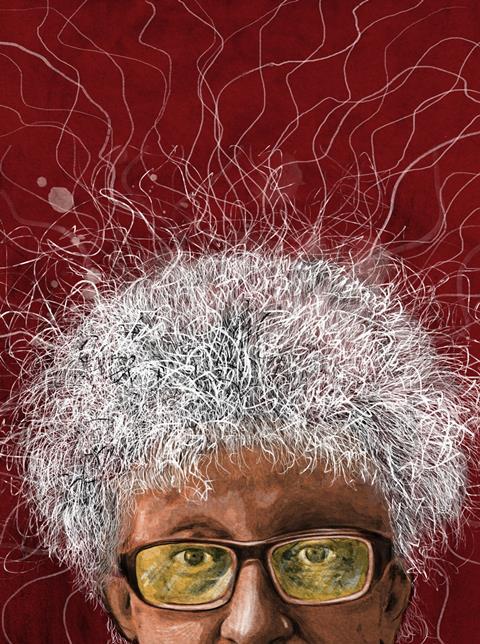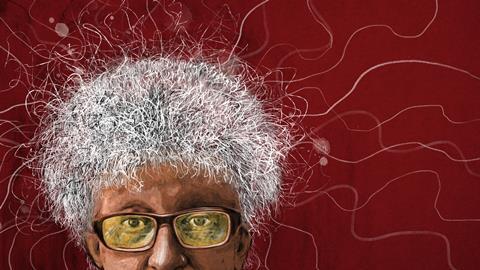The YouTube star on green chemistry, Rosalind Franklin and the importance of technicians
Martyn Poliakoff is a research professor at the University of Nottingham, UK and fellow of the Royal Society. An expert in green chemistry, he is also known for hosting the Periodic Table of Videos on YouTube. He was speaking to Kit Chapman.
I like speaking foreign languages, particularly Russian. I’m half-Russian, my father was born in Moscow. My French and German are rather rusty, and I once tried Chinese but I didn’t get very far. I can read Cyrillic, but I not sure that I’ve ever read a whole book from end to end in Russian.
I went to an English boarding school – that’s enough to put anybody off sport! I enjoyed the countryside aspect of boarding school. I hated the food. I once threw up over the dining table when forced to eat meat paste at tea.

As a schoolboy I built a Van de Graaff generator out of a copper ballcock from a lavatory cistern, a plastic drainpipe and the reflector from a car headlight. It wasn’t brilliant but I think it produced about 100,000 volts, which was still moderately spectacular. I was lucky to grow up in a time when people did built apparatus a lot more. One of my students was offered a job by a visiting industrialist on the strength that she had spanners poking out of her lab coat where others have pens.
I might have met Rosalind Franklin. When I was five I was page at a wedding, and the bridesmaid was Rosalind’s niece. It’s quite likely that she was at the wedding, but obviously I was too young to know who she was.
When I’m working I listen to the radio a lot, particularly BBC Radio 3. I like Beethoven and Russian composers. I can’t read a note of music, I’m quite unmusical. I whistle tunelessly, and when younger I apparently used to sing hymns out of tune in the laboratory.
I am interested in natural history. I like seeing what’s swimming around in our garden pond. I spent quite a lot of my youth living in the countryside, although I’m not sure I’d want to live there permanently; I’m not enthusiastic enough about cars to want to drive every time I need to shop. I’m a Londoner by birth so I feel quite at home in the city.
I’m a compulsive book-buyer. We have a very large collection of books in our house, with piles of books everywhere. I try to read quite a lot, particularly history, science and biography.
I sometimes feel I’ve never grown up very much in some aspects, like a chemical Peter Pan.
One of the people who particularly inspired me was George Pimentel. I only met him twice but he was my PhD supervisor’s guru and from a distance had a huge impact on my life. I’ve always admired Roald Hoffmann, and there are some unsung chemists who have been very influential. There was a colleague in Newcastle called Alec Campbell. He started as a technician and ended doing all the teaching in what is now the foundation year. He taught me a lot about teaching. I’ve also been heavily influenced by my friend David Jones, who used to write as Daedalus. Most of all I’ve been influenced by my PhD supervisor, Jim Turner, whom I worked with for 32 years. He still lives in Nottingham and I see him quite regularly. He’s still far brighter than me!
One of the people who particularly inspired me was George Pimentel (Chemistry World, February 2017, p68). I only met him twice but he was my PhD supervisor’s guru and from a distance had a huge impact on my life. I’ve always admired Roald Hoffmann, and there are some unsung chemists who have been very influential. There was a colleague in Newcastle called Alec Campbell. He started as a technician and ended doing all the teaching in what is now the foundation year. He taught me a lot about teaching. I’ve also been heavily influenced by my friend David Jones, who used to write as Daedalus. Most of all I’ve been influenced by my PhD supervisor, Jim Turner, whom I worked with for 32 years. He still lives in Nottingham and I see him quite regularly. He’s still far brighter than me!
Technicians have been important in my career. Our videos just wouldn’t happen without our remarkable technician Neil Barnes. Technicians help in all aspects of the scientific enterprise. I’m still in touch with one of the technicians who built my equipment in the 1970s, we exchange Christmas cards and so on. They are enormously important.
I’m excited that photochemistry is now becoming an a hot topic. With luck, together with my colleague Mike George and collaborators in Bristol and Southampton, we might help bring photochemistry to chemical manufacture in the UK. My passion, the area I’m most interested in, is green chemistry. This is a huge challenge – how we chemists are going to provide the chemical needs of the future. As one gets older you begin to worry more about future generations. The most important challenge is how can we make more chemicals from the same amount of feedstock. I’ve encapsulated this into what I call the Robin Hood question: how can we give to the poor without robbing the rich?
I sometimes feel I’ve never grown up very much in some aspects, like a chemical Peter Pan. As a chemist, although I’m sometimes quite impressed by my old papers, it’s always the new experiments and research that are the most exciting. It’s good to go on until you feel it’s not very useful, although I think nowadays there’s all sorts of administrative hassle that didn’t exist when I was younger. Some of it is inevitable and some is irritating, and I can imagine in due course I might get fed up with it. I do hope I will outlive this bureaucracy and emerge safely out of the other side. But that’s some hope.
Martyn Poliakoff is a research professor at the University of Nottingham, UK and fellow of the Royal Society. An expert in green chemistry, he is also known for hosting the Periodic Table of Videos on YouTube. He was speaking to Kit Chapman.













No comments yet